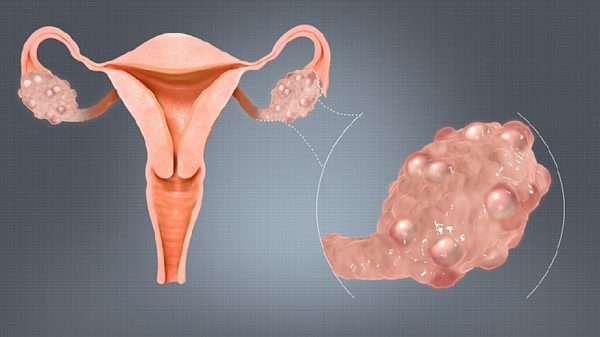
PCOS causes symptoms and diet
Polycystic ovary syndrome, commonly known as PCOS is a condition that occurs in women of reproductive age. Women who suffer from PCOS will have hormonal imbalance associated with problem in metabolism.
Symptoms of PCOS: Symptoms and signs of PCOS from woman to woman can vary. During diagnosis of PCOS any of the following symptoms can one experience
Excess androgen: Androgen is male hormone that is also expressed in females. If the androgen level elevates then it results in excess facial and body hair, severe acne and baldness as we see in male.
Irregular or no period: Infrequent, prolonged or irregular menstrual cycle is common symptom. One might experience fewer and heavier period and a gap of more than 35 days in each cycle. With PCOS, woman might not have enough of progesterone hormones and it can make miss period for long time or might have periods that are irregular and hard to predict.
Polycystic ovaries: Enlarge ovaries might contain follicles or cysts surrounding eggs. Because of this, ovaries will fail to function regularly. It can affect women to conceive.
Other symptoms: skin tags, dandruff, acne, high stress level, sleep apnea.
What causes PCOS?
The exact reason for why some women get PCOS is not known. It can be hereditary. If body produces too much insulin then it can affect ovaries and ovulation. Research and studies have shown that women with PCOS can have low grade inflammation that stimulate many cysts in ovaries to produce androgens.
Risk factors:
PCOS can also cause other health problems because it is associated with improper metabolism and can result in high blood pressure, insulin resistance, high cholesterol and diabetes, infertility, sleep apnea, liver problems.
Other major risk factors with PCOS are: metabolic syndrome, obesity associated with depression and anxiety.
Treatments: Doctor can diagnose PCOS through family history and symptoms, pelvic exams, blood test for hormone, cholesterol, sugar level. Based on diagnosis doctor can prescribe birth control pills, infertility medication or diabetes medications.
Sometime surgical method might be helpful – ovarian drilling to release androgen level, cyst aspiration or depending on the severity of condition removal of one or both ovaries.
Diet for PCOS:
According to study conducted on several PCOS suffering women, diet can help to reduce the symptoms and bring regularity in periods. Women who follow proper diet can conceive even with PCOS.
Which diet is better for PCOS? A better understanding of body and what to eat is essential to overcome PCOS and stress.
- High fiber food – digestive fiber food containing vegetable and fruits
- Unprocessed, natural foods
- Broccoli, cauliflower and including mustard oil in food helps
- If you are non-vegetarian then reduce red meat or no meat. Salmon, tuna, sardines and mackerel – these fish foods help
- Include healthy fats like canola, olive oil and avocado oil.
- Nuts – walnut, almond and pistachios
- Less or no sugar. Consider taking dark chocolate in moderation
- Include turmeric in daily cooking
- Cinnamon helps to reduce cholesterol – is a good addition in the diet
- Consider DASH diet
- Use more leafy green vegetables, lentils, finger millet and quinoa
- Low carbohydrate and less glycemic index diet to improve insulin metabolism
- Say no to processed foods, meats, hot dogs etc
- Reduce fried foods and avoid fast food
- Do not drink sugary beverages, sodas, avoid bakery food
- Avoid solid fats such as shortening, margarine and lard.
Change life style with good hobbies, set goal in your life and take care of your psychological well being. Practicing yoga, meditation, participating in group activities, spending time with like minded people and working on stress management, avoiding over commitment and taking time to relax will help to manage PCOS
References:
https://www.medicalnewstoday.com/
www.healthylife.werindia.com
www.endocrynologyadvisor.com
Image credit: https://commons.wikimedia.org/wiki/File:Polycystic_Ovaries.jpg
Attribution;http://www.scientificanimations.com / CC BY-SA (https://creativecommons.org/licenses/by-sa/4.0)
Author: Sumana Rao | Posted on: January 27, 2020
« Natural ways to control Blood sugar level New Research: The Right Way to Wash Hands »






















Write a comment